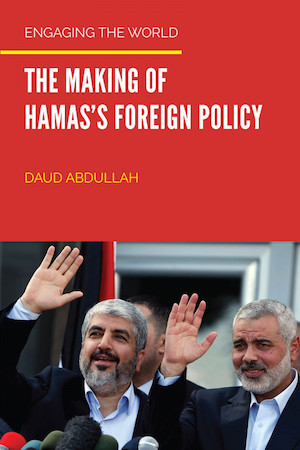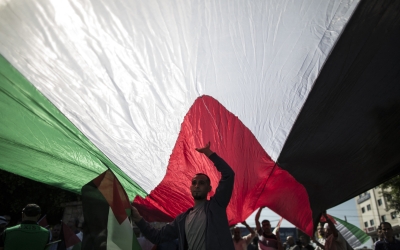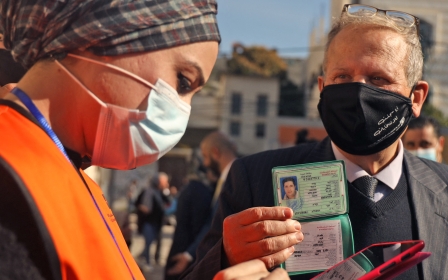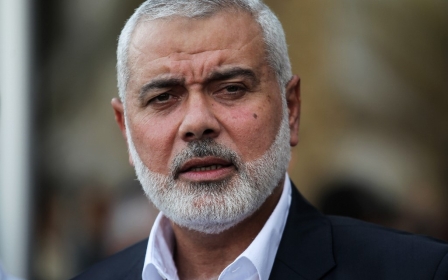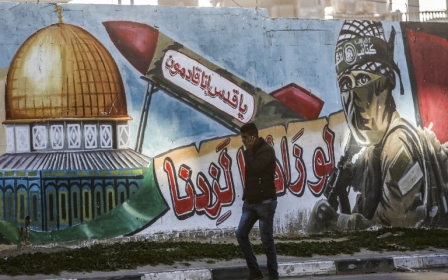Engaging the world: How Hamas crafts its foreign policy
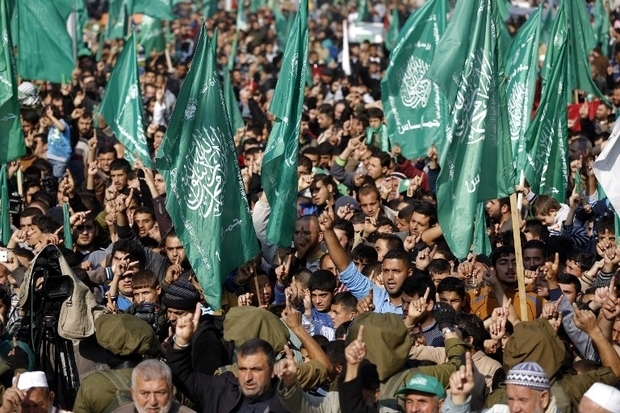
A new book explores the trajectory of the Palestinian movement Hamas’s external relations since its inception. In Engaging the World: The Making of Hamas’s Foreign Policy, author Daud Abdullah compellingly weaves background research together with primary sources to provide a comprehensive picture of Hamas’s foreign policy.
Abdullah contextualises the discussion through episodes such as Iraq’s invasion of Kuwait in 1990, and within the broader perspective of the Palestinian national movement.
The book, which examines Hamas’s relations with different states, begins by defining the principles that guide the group: non-intervention, resistance within Palestine, avoiding conflicting alliances, and independent decision-making.
Abdullah hails as pragmatic the “delicate balance” between idealism and realistic politics. Hamas enjoyed strong relations with the Assad regime in Syria and the Gaddafi regime in Libya, despite their hostility towards the Muslim Brotherhood, from which Hamas emerged in 1987.
'The third Nakba'
New MEE newsletter: Jerusalem Dispatch
Sign up to get the latest insights and analysis on Israel-Palestine, alongside Turkey Unpacked and other MEE newsletters
The first challenge to Hamas’s principles came through Iraq’s invasion of Kuwait. Although the Palestinian Liberation Organization (PLO) sided with Iraq, Hamas rejected the invasion and the Iraqi narrative linking the liberation of Palestine to withdrawal from Kuwait. The crisis led to what the author calls “the third Nakba”, referring to the approximately 400,000 Palestinians who fled or were expelled from the country.
Hamas, based in Kuwait at the time, moved to Jordan, where it had a “gentleman’s agreement” to ensure respect for its principles. Of note was the movement’s refusal to participate in the Syrian conflict or to support the regime, leading to the loss of the most privileged political base Hamas ever possessed. The author links Hamas’s neutrality to lessons learned from the PLO’s historical mistakes in Jordan and Lebanon.
Abdullah argues that Hamas’s strong and coherent leadership attracted international attention. In Marj az-Zuhur in southern Lebanon, to where Israel expelled 415 members of Hamas and Islamic Jihad in 1992, the author shows how Hamas leaders managed to shed international light on the ordeal of freezing winter tents and Israeli fire - a “turning point” for the group, despite its activities during the First Intifada.
Hamas also regained Iran’s support after its “steadfastness” in the 2014 Israeli war on Gaza. My own research into Hamas concurs with Abdullah’s argument that the group elects leaders who will be the first to pay the price for the movement’s goals.
Despite crackdowns by Israel and the Palestinian Authority (PA), Hamas survived, gained office and claimed leadership of the Palestinian resistance.
Opening to the Global South
And yet, Abdullah states that “mere survival is not enough”, noting that the movement must expand from its “Arab and Islamic environs”. He stresses the importance of foreign policy and international recognition, as Israel and its western allies consistently attempt to isolate Palestinian liberation movements. In response, he says, Hamas must open itself to the Global South and not “underestimate the influence of the Global South on world affairs”.
Abdullah also explores Hamas’s relations with Russia, China, South Africa and Malaysia. One result of diplomatic inroads was Russia’s vote against a US-proposed UN resolution condemning Hamas. The book shows how Palestinians ultimately lost the support of India, and how Brazil’s Palestinian population could help to open new diplomatic channels. Abdullah urges Hamas to transcend religion and “acquire skills to operate outside its Muslim comfort zone”.
Abdullah does not shy away from seeing Hamas as a liberation movement against a settler-colonial regime
Hamas’s relations with Arab and Muslim countries and the Global South tell half the story. The other half is about how western countries, mainly the US, work against Hamas as a liberation movement. These relations are framed by Hamas’s stand on “armed resistance” and its “rejection of the Oslo process”. The US has tried to isolate Hamas by pressing the PA to arrest and torture its members, and by pressuring other states.
When Hamas was elected to office in 2006, the US incited an internecine war between Hamas and the incumbent Fatah, planning a “hard coup” to overthrow Hamas. While the EU supports the US position on Hamas, the author sees a window of opportunity for Hamas to channel its message to EU policymakers.
Resistance and recognition
Due to western pressure, none of Hamas’s external gains have “mitigated the enormous difficulties that confront the Palestinian national movement”, Abdullah notes. Hamas sees the continuity of resistance as “an achievement in itself”, and its electoral victory prevented the PA from criminalising resistance. But the author criticises this approach of viewing resistance as an alternative to international recognition.
Hamas’s relations with Egypt are missing from the book. Hamas saw revolutionary and democratic Egypt as an ally, given the country’s regional importance and border with Gaza. During Israel’s 2012 war on Gaza, Egypt endorsed the Palestinians, leading to gains for the Hamas government.
But I disagree with the author’s suggestion that Hamas abandoned its Syrian base “because of idealism”; Hamas leaders told me in 2012 that they were planning to move their political bureau from Damascus to Cairo, and were constrained by Egypt’s position on the removal of the Assad regime.
Abdullah’s book aims to engage a diverse readership, including academics, laypersons and Hamas policymakers. It is written in the spirit of activism, but without violating academic ethics. Abdullah does not shy away from seeing Hamas as a liberation movement against a settler-colonial regime, describing Palestine as “one of the great moral and political issues of our times”.
The views expressed in this article belong to the author and do not necessarily reflect the editorial policy of Middle East Eye.
Middle East Eye delivers independent and unrivalled coverage and analysis of the Middle East, North Africa and beyond. To learn more about republishing this content and the associated fees, please fill out this form. More about MEE can be found here.



